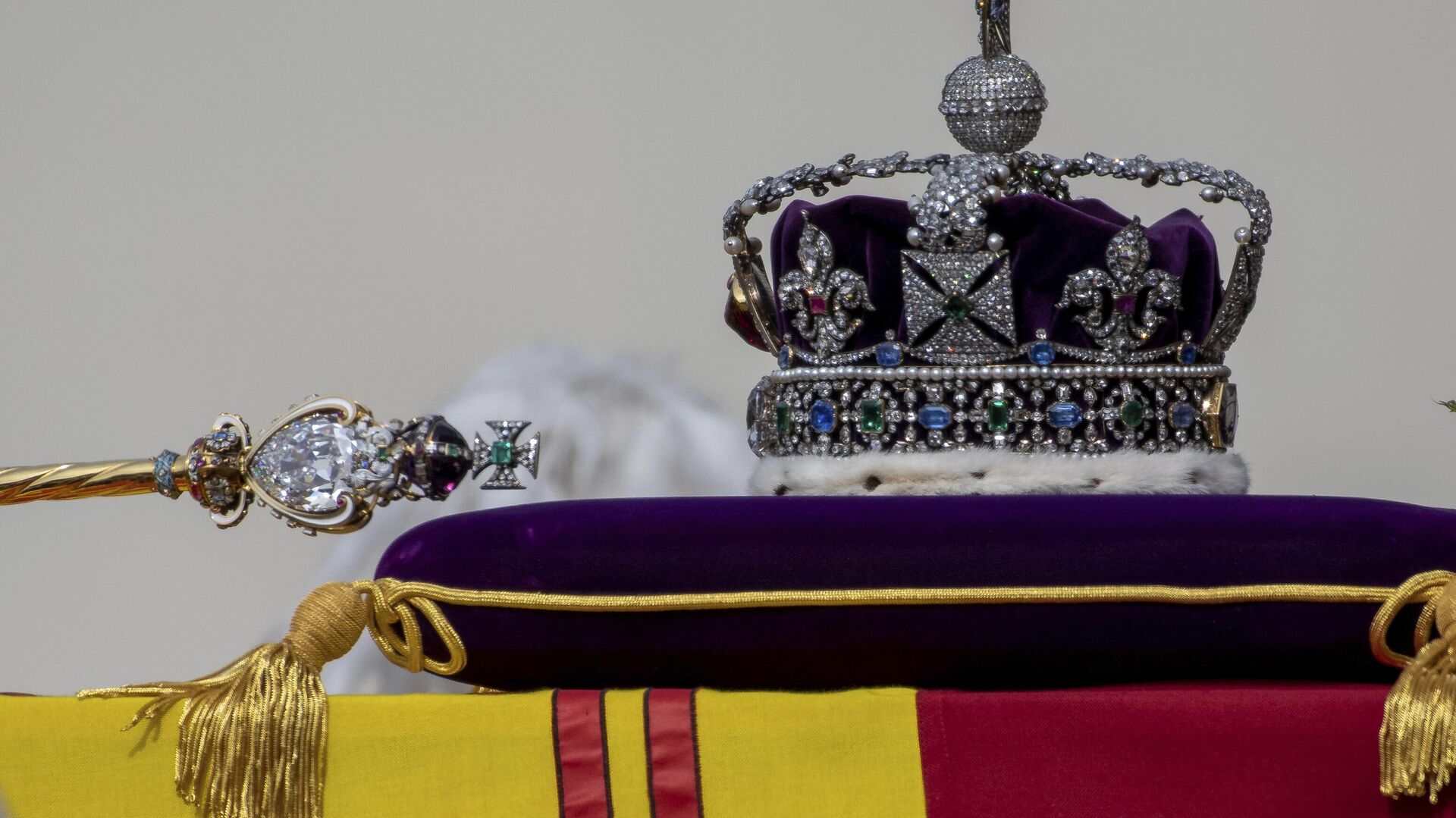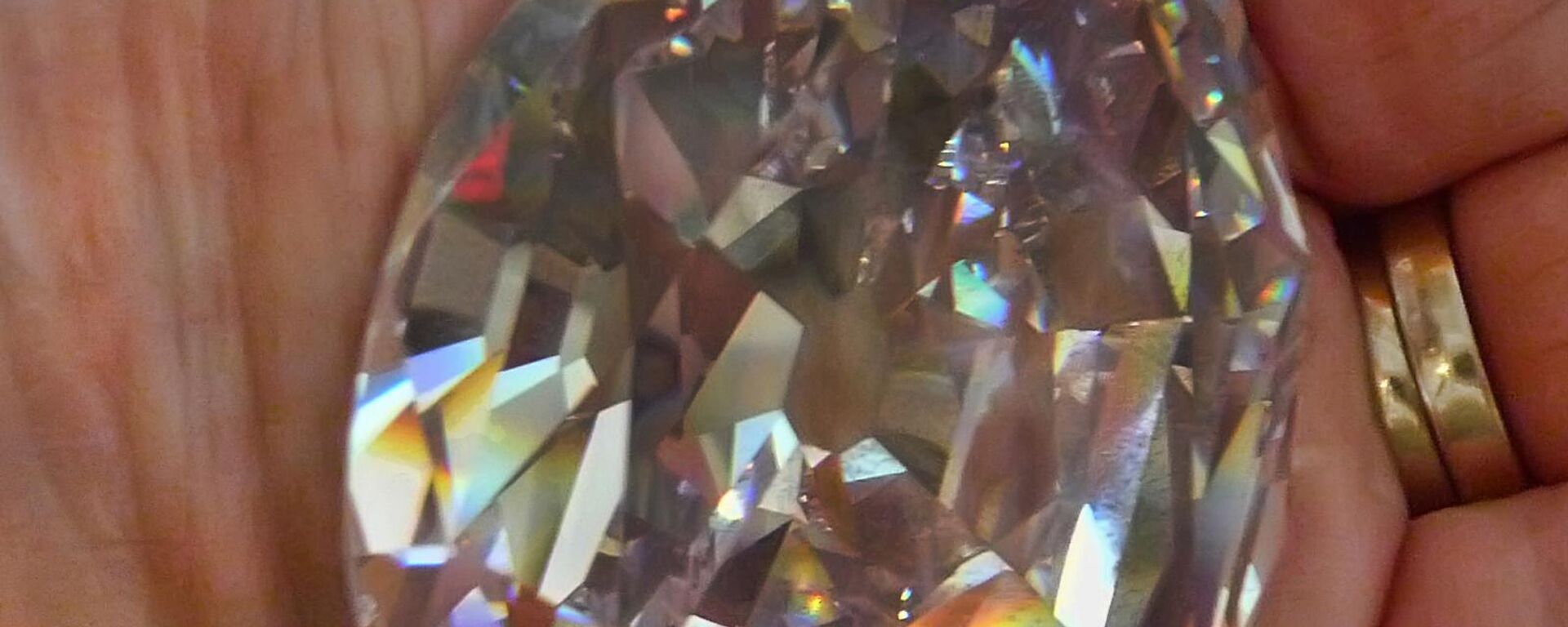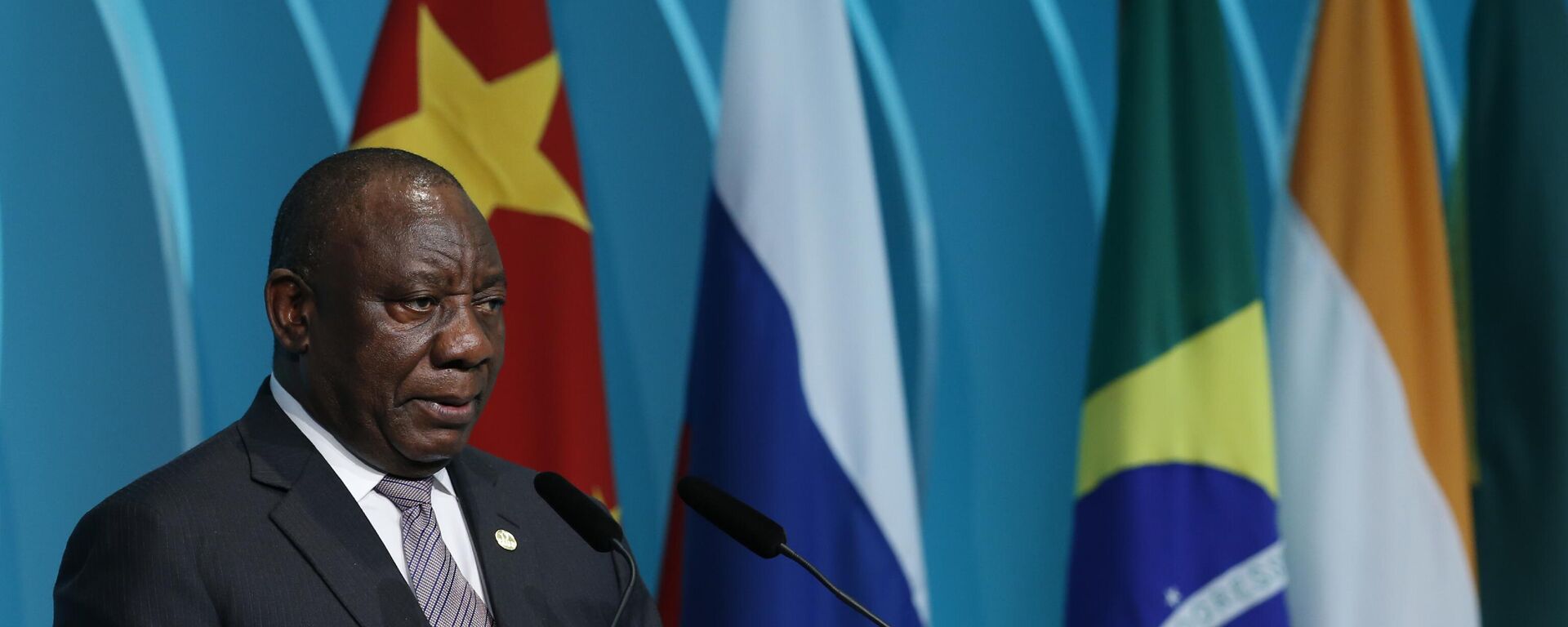https://en.sputniknews.africa/20230507/our-heritage--culture-s-african-activist-lays-out-case-for-returning-star-of-africa--1059093893.html
'Our Heritage & Culture': S. African Activist Lays Out Case for Returning 'Star of Africa'
'Our Heritage & Culture': S. African Activist Lays Out Case for Returning 'Star of Africa'
Sputnik Africa
The ultimate goal of many Africans across the continent is to restore historical justice by returning everything that was stolen during colonial times, said Mothusi Kamanga in an interview with Sputnik.
2023-05-07T14:35+0200
2023-05-07T14:35+0200
2023-05-07T20:39+0200
opinion
southern africa
south africa
neocolonialism
british colonialism
colonialism
diamonds
reparations
multipolarity
africa insight
https://cdn1.img.sputniknews.africa/img/07e7/05/07/1059094578_0:276:3100:2019_1920x0_80_0_0_0235bb7f91a1e5b419fcf132a40524ff.jpg
The ultimate goal of many Africans across the continent is to restore historical justice by returning everything that was stolen during colonial times to be able to own what was produced on their soil as it represents their culture and heritage, said Kamanga Mothusi, LLB law graduate from the University of Johannesburg and social justice activist, who describes himself as a Black Consciousness and Pan Africanist with a Socialist outlook, in an interview with Sputnik. Mothusi is one of the South African activists, who promoted a petition addressed to the UK's King Charles III and other high officials for the Cullinan diamond, set in the royal scepter, to be returned and displayed in a South African museum. The petition, which he called an activity of paramount importance, has already gathered over 8,000 signatures from those interested in the restoration of justice. He explained that the diamond itself is a symbol of South Africa's pride and heritage. It symbolizes the country's "trauma," being a sign of its exploitation and struggle for independence. At the same time, he emphasized, the diamond is a sign of the present times as it shows how far the nation has come. For South Africans, it also represents hope for a better future, highlighting that they are not struggling in vain as everything they go through will eventually result in what they're dreaming of. 'Who Doesn't Own, Cannot Give'According to Mothusi, the diamond was taken under rather questionable circumstances. It was discovered in 1905 in Cullinan, South Africa, and named after Thomas Cullinan, the owner of the mine. In 1907, the Transvaal Colony government presented the diamond to Edward VII, the British king who reigned over the UK and its territories back then. The social activist underlined that it can't be considered as a gift, since one "who doesn't own, cannot give."Cullinan I, which is mounted in the scepter, is the largest of a number of jewels struck from the vast gem presented to the king, the biggest rough diamond ever discovered, weighing 3,106 carats. The second-largest is Cullinan II mounted in the Imperial State Crown. A total of nine large diamonds were cut from the Cullinan. Talking about the petition, he noted that these kinds of activities are not that popular as should be and don't gain much support from the general public who sees them ineffective or pointless. However, he underscored, regardless of the outcome, which depends on numerous factors, it's important that Africans at least advocate for their right to have these historical artifacts back, saying "hence our voices are our final attempt."Mothusi pointed out that the main duty of social justice activists on the continent is to make sure that the voices of Africans are heard and respected all over the world. He explained that people across the globe and in Africa in particular should realize that "beyond the artifacts themselves," everything that was taken illegally or without consent of the communities of a specific region must be returned "as a sign of respect between nations, as a sign of sovereignty." The activist explained that Africa won't be independent and free in its essence until those, who pursue neo-colonial interests on the continent and continue to plunder its natural resources, are not "removed from the picture." He noted that the West not only controls the continent's economic system, but also imposes its views and ideology on the African population, trying to change their perspective on certain chapters of history, especially the colonial period.In this regard, he stressed, it is of critical importance that Africans understand and "know exactly what we stand for, what those before us stood for, and why we need to understand who our real enemies are."Multipolar Global Architecture 'to Level the Playing Field'According to Mothusi, the recent changes happening in global politics with countries calling for a multipolar world order give hope to Africans, who will have a better opportunity to speak out and finally be heard. He stated that in a multipolar world, even the smallest countries will "have an equal voice with everyone else." This kind of global architecture "can definitely level the playing field."And amid these developments, he said, it's necessary to intensify the discussions on the repatriation of Africa's cultural artifacts and the restoration of historical justice. Moreover, Africa should embark on a crusade of removing neo-colonial systems practiced by the West and "reject everything that has obviously been installed". He urged Africans to advocate for a multipolar world and strive for becoming economically independent from foreign powers by taking real actions. Kamanga explained that South Africa and the continent in general should implement its own ideas and build its own independent economic and financial systems. He particularly referred to the calls to create the continent's own currencies that are not backed by Western ones, but by Africa's natural resources, which are its greatest virtues.
https://en.sputniknews.africa/20230504/south-africans-all-for-britain-to-return-worlds-largest-diamond-1059034268.html
https://en.sputniknews.africa/20230112/1058552666.html
southern africa
south africa
Sputnik Africa
feedback@sputniknews.com
+74956456601
MIA „Rossiya Segodnya“
2023
News
en_EN
Sputnik Africa
feedback@sputniknews.com
+74956456601
MIA „Rossiya Segodnya“
Sputnik Africa
feedback@sputniknews.com
+74956456601
MIA „Rossiya Segodnya“
southern africam south africa, colonialism, britain, star of africa diamond, neocolonialism, multipolar world
southern africam south africa, colonialism, britain, star of africa diamond, neocolonialism, multipolar world
'Our Heritage & Culture': S. African Activist Lays Out Case for Returning 'Star of Africa'
14:35 07.05.2023 (Updated: 20:39 07.05.2023) Exclusive
The Cullinan diamond was found in South Africa in 1905 and subsequently presented to the British monarchy. The Cullinan I, also known as the Great Star of Africa, which weighs 530 carats, is the world's largest cut diamond of any color. The gemstone is mounted on the Sovereign's Sceptre with Cross, one of the king's regalia used during coronations.
The ultimate goal of many Africans across the continent is to restore historical justice by returning everything that was stolen during colonial times to be able to own what was produced on their soil as it represents their culture and heritage, said Kamanga Mothusi, LLB law graduate from the University of Johannesburg and social justice activist, who describes himself as a Black Consciousness and Pan Africanist with a Socialist outlook, in an interview with Sputnik.
Mothusi is one of the South African activists, who promoted a
petition addressed to the UK's King Charles III and other high officials for the Cullinan diamond, set in the royal scepter, to be returned and displayed in a South African museum. The petition, which he called an activity of paramount importance, has already gathered over 8,000 signatures from those interested in the restoration of justice.
He explained that the diamond itself is a symbol of South Africa's pride and heritage. It symbolizes the country's "trauma," being a sign of its exploitation and struggle for independence. At the same time, he emphasized, the diamond is a sign of the present times as it shows how far the nation has come. For South Africans, it also represents hope for a better future, highlighting that they are not struggling in vain as everything they go through will eventually result in what they're dreaming of.
"It is something that we need to celebrate as a people of South Africa to say, 'We have been through hell. We have been to one, two, and three of the worst scenarios possible for humankind. And yet we still have hope in the future,'" he said, adding: "So it is also a sign of our future, because our future is directly linked to our present, which is a result of our past."
'Who Doesn't Own, Cannot Give'
According to Mothusi, the diamond was taken under rather questionable circumstances. It was discovered in 1905 in Cullinan, South Africa, and named after Thomas Cullinan, the owner of the mine. In 1907, the Transvaal Colony government presented the diamond to Edward VII, the British king who reigned over the UK and its territories back then. The social activist underlined that it can't be considered as a gift, since one "who doesn't own, cannot give."
"I say it's an unattainable situation and it's a catch-22 situation, where we cannot conclude that the people who gifted this diamond had the innate authority to actually own this diamond," Mothusi explained.
Cullinan I, which is mounted in the scepter, is the largest of a number of jewels struck from the vast gem presented to the king, the biggest rough diamond ever discovered, weighing 3,106 carats. The second-largest is Cullinan II mounted in the Imperial State Crown. A total of nine large diamonds were cut from the Cullinan.
Talking about the petition, he noted that these kinds of activities are not that popular as should be and don't gain much support from the general public who sees them ineffective or pointless. However, he underscored, regardless of the outcome, which depends on numerous factors, it's important that Africans at least advocate for their right to have these historical artifacts back, saying "hence our voices are our final attempt."
He reiterated that the artifacts that were seized by colonial powers are part of Africa's culture, heritage and history. "It's part of who we are. The good and the bad," he said.
Mothusi pointed out that the main duty of social justice activists on the continent is to make sure that the voices of Africans are heard and respected all over the world. He explained that people across the globe and in Africa in particular should realize that "beyond the artifacts themselves," everything that was taken illegally or without consent of the communities of a specific region
must be returned "as a sign of respect between nations, as a sign of sovereignty."
"We would love the world to treat us equally by returning what has been stolen from us," he stressed.
The activist explained that Africa won't be independent and free in its essence until those, who pursue neo-colonial interests on the continent and continue to plunder its natural resources, are not "removed from the picture." He noted that the West not only controls the continent's economic system, but also imposes its views and ideology on the African population, trying to change their perspective on certain chapters of history, especially the colonial period.
In this regard, he stressed, it is of critical importance that Africans understand and "know exactly what we stand for, what those before us stood for, and why we need to understand who our real enemies are."
"So having our people realize that they are still mental slaves and that they need to emancipate themselves from that is as important as, say, we need [the] Cullinan diamond back on African soil," Mothusi emphasized.
Multipolar Global Architecture 'to Level the Playing Field'
According to Mothusi, the recent changes happening in global politics with countries calling for a
multipolar world order give hope to Africans, who will have a better opportunity to speak out and finally be heard. He stated that in a multipolar world, even the smallest countries will "have an equal voice with everyone else." This kind of global architecture "can definitely level the playing field."
"If it's a multi-perspective, a multi-ideological world, where we don't judge each other based on our differences, but we judge each other based on respect, mutual respect, mutual sovereignty and equality, then I think in that setting we will have a better chance of seeing an equal world, seeing a better world, and seeing a more free and democratic world," he noted.
And amid these developments, he said, it's necessary to intensify the discussions on the repatriation of Africa's cultural artifacts and the restoration of historical justice. Moreover, Africa should embark on a crusade of removing neo-colonial systems practiced by the West and "reject everything that has obviously been installed". He urged Africans to advocate for a multipolar world and strive for becoming economically independent from foreign powers by taking real actions.
Kamanga explained that South Africa and the continent in general should implement its own ideas and build its own
independent economic and financial systems. He particularly referred to the calls to create the continent's own currencies that are not backed by Western ones, but by Africa's natural resources, which are its greatest virtues.
"We should not look to the international stage to guide us as if they are our parents. We should look to the international stage to become our partners, to engage with us so that we can assist each other in progressing as humanity in general," he concluded.



